|
Here are all the paintings of WERFF, Adriaen van der 01
| ID |
Painting |
Oil Pantings, Sorted from A to Z |
Painting Description |
| 7199 |
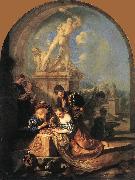 |
Children Playing before a Hercules Group |
1687
Oil on panel, 46,8 x 35 cm
Alte Pinakothek, Munich |
| 7200 |
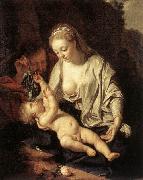 |
Holy Family |
1714
Oil on panel, 36 x 29 cm
Amstelkring Museum, Amsterdam |
| 7201 |
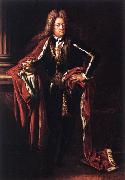 |
Johann Wilhelm, Elector Palatine of Pfalz |
1700
Oil on canvas, 76 x 54 cm
Staatsgalerie, Schleissheim |
| 7202 |
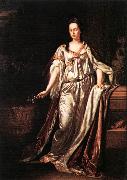 |
Maria Anna Loisia de Medici |
1700
Oil on canvas 77 x 53 cm
Staatsgalerie, Schleissheim |
| 43629 |
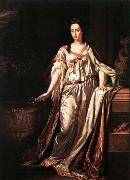 |
Maria Anna Loisia de-Medici |
1700
Oil on canvas
77 x 53 cm |
| 7203 |
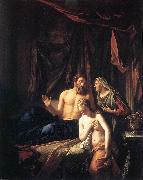 |
Sarah Presenting Hagar to Abraham |
1699
Oil on canvas, 76,3 x 61 cm
Staatsgalerie, Schleissheim |
| 7204 |
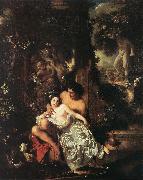 |
Scene with Shepherd |
1689
Oil on oak, 58,5 x 47,5 cm
Gemäldegalerie, Dresden |
|
|
| WERFF, Adriaen van der
|
| Dutch Baroque Era Painter, 1659-1722
Dutch painter and draughtsman. He was apprenticed to the portrait painter Cornelis Picolet (1626-79) from 1668 to 1670 and then from c.1671 to 1676 to Eglon van der Neer in Rotterdam. From 1676 van der Werff produced small portraits and genre paintings as an independent master; the Cook and Hunter at a Window (1678; New York, priv. col.; see Gaethgens, no. 2) and Man and Woman Seated at a Table (1678; St Petersburg, Hermitage) perpetuate the thematic and stylistic traditions of Gerrit Dou, Gabriel Metsu, Frans van Mieris and Gerard ter Borch (ii) but are distinguished by their greater elegance and richness of costume and interior. Van der Werff's portraits date mainly from the years 1680-95 (e.g. Two Children with a Guinea-pig and a Kitten (1681; London, Buckingham Pal., Royal Col.)). The motif of children with animals recalls van der Neer, while the careful depiction of fabrics recalls the Leiden school of 'Fine' painters. His Portrait of a Man in a Quilted Gown (1685; London, N.G.) resembles compositions by Caspar Netscher and Nicolaes Maes: a figure leaning against a balustrade, before a landscape. Van der Werff's work is, however, more elegant, in part because of the depiction of fabrics, but also because of the inclusion for the first time of Classical sculpture, in this case the Farnese Flora
|
|

